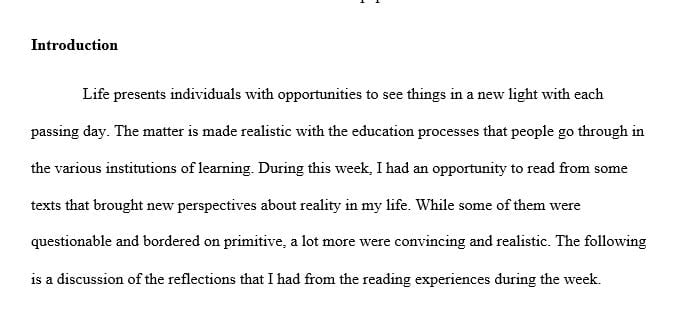What ideas were new to you – eye openers. How and why did they make you think differently about diversity
A very important part of this course is learning to carefully reflect. You have all read and written throughout your academic and work careers. But careful reflection is not often something we are asked to do. At work, one is rewarded for quick decision-making (although it must be thoughtful). But being thoughtful can be different from being reflective; being thoughtful is using careful reason, while reflection is concerned with ideas and introspective pondering. We often consider issues with reason, yet we are often so “hurried” or “inexperienced” that we do not ponder over time. This is seen as a luxury within our society, yet it is critical for engaging the big issues that shape and frame our very existence. I also hope you will be reflexive in addition to being thoughtful – turning these ideas back onto yourself in order to shed light on your own beliefs, values, philosophy, and identities. Many philosophers have noted that to develop knowledge, one must know oneself. If we do not understand our own belief systems, we cannot realize how they constrain us from engaging new ideas. The more reflexive you are, the better able you will be to securely open yourself up to new ideas, without feeling threatened.
Understanding your beliefs usually leads to expanding the ideas you engage with and eventually your knowledge base. To grow as an educator, practitioner, and scholar, you must also grow personally. We often try to separate these two process, but I believe they are integrally connected. Therefore, I encourage you to think about all our class readings, activities, and discussions in relation to your own experiences. Some good generic questions while reading each chapter/article include:
1. What ideas were new to you – eye openers. How and why did they make you think differently about diversity, multiculturalism, power, privilege, and social justice?
2. Which points in the chapter/article were well substantiated, questionable or wrong. You may agree with a point the author made, but believe they did not make a strong enough case. Strive at times to examine the logical development.
3. In what ways does a chapter/article for one week compare to previous week’s readings?
4. What are the implications of this chapter/article for improving current policies and practices?
5. Did the material introduce you to anything about which you want to learn more?
6. How does a particular chapter/article shed light on an educational issue you are concerned with?
. This essay should not simply be a recounting of an experience you had, or a simple summary of something you read. You must delve deeper—what meaning is there, what connections exist, how does the reading or experience expand your knowledge and skills, how does it challenge you, how does it create an opportunity for you to be a change agent (or not)?
*Reflective Essay. Your essays should be approximately 750 words, unless otherwise indicatedYour journal entries should be both reactive and responsive to some aspect of the week’s readings, make connections to your own personal experiences, and show how you are evolving in your thinking about diversity, multiculturalism, power, privilege, and social justice, and various social identities. I expect your essays to follow proper APA style and formatting, including use of citations and references; these are not informal, colloquial essays, and as such should not be written as if you are sending an email or text to your BBF.
from these books .( I will scan them for you .)
Thanks .. please I need something very professional.
Answer preview to what ideas were new to you – eye openers. How and why did they make you think differently about diversity

860 words


